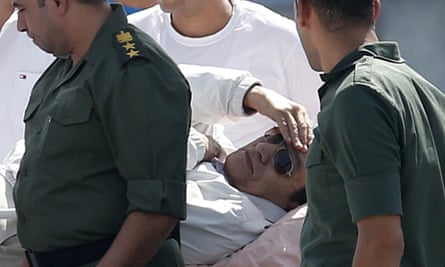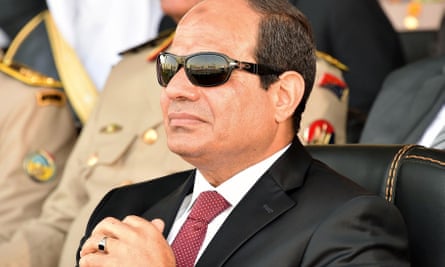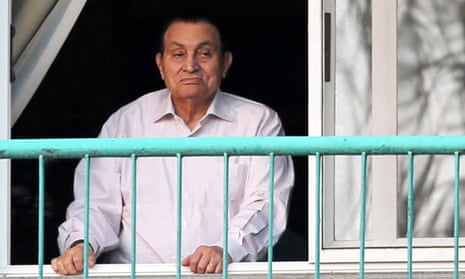Egypt’s former dictator Hosni Mubarak has left the Cairo military hospital where he had been held in custody for much of the past six years, and returned to his home in the Cairo suburb of Heliopolis, his lawyer said.
Mubarak, 88, was acquitted by Egypt’s highest appeals court on 2 March of conspiring to kill protesters in the final verdict in a long-running case that originally resulted in him being sentenced to life in prison in 2012 over the deaths of 239 people in Arab spring protests against his rule. A separate corruption charge was overturned in January 2015.
He left the Maadi military hospital on Friday morning and returned to his home, where he had breakfast with his family and a number of friends, according to a report in the privately owned newspaper al-Masy al-Youm. His lawyer, Farid al-Deeb, told the paper that Mubarak thanked those who had supported him throughout his trial.
The strongman, who ruled Egypt for nearly three decades, often appeared in a frail state during his court appearances, attending on a stretcher and wearing dark sunglasses, but the appearances put paid to repeated rumours of his death.

Mubarak was also healthy enough to appear at the window of his hospital room to wave to supporters gathered outside on occasions including his birthday and the anniversary of Egypt’s 1973 war with Israel.
For those who worked to topple the former dictator, Mubarak’s freedom marks a grim moment in Egypt’s modern history. Yet some reacted with little more than resignation as his release became imminent, numbed by the years of political turmoil since his fall.
Mubarak’s democratically elected successor, Mohamed Morsi, was overthrown in a popularly backed military coup in 2013. Many see echoes of Mubarak’s style of leadership in Egypt’s current leader, the former general Abdel Fatah al-Sisi.
“I’m neither sad nor disappointed,” said Tarek el-Khatib, whose brother, Mustafa, was killed in the struggle to topple Mubarak. “I’d have been surprised had things happened otherwise. Politically, everything flew in this direction and paved the way for the normality of this moment.”
Over the past six years there have been repeated efforts to punish family members and business associates who profited from Mubarak’s regime, largely without lasting consequence. Mubarak’s sons, Alaa and Gamal, were freed in October 2015, with a judge stating that they had served adequate jail time on charges of corruption and embezzlement of public funds.
The notorious steel tycoon Ahmed Ezz, formerly the secretary general of Mubarak’s now defunct National Democratic party, was named as an honorary leader of a political party in 2016, although he had previously served three years on corruption charges.
Despite describing the revolution that ended Mubarak’s rule as “a turning point in Egypt’s history,” Sisi and his military-backed government are regarded as the autocrat’s political heirs.
“I think that Mubarak’s release was something expected as his students are ruling the country,” said Mahienour el Massry, an activist and lawyer who served 15 months in prison under Sisi’s rule. “The same regime, the same corruption, the same brutality.
“Mubarak might be released, but in the eyes of those who believe in the revolution he will always be a criminal killer and the godfather of corruption,” she said. “This might be another round that we have lost, but we will keep on fighting to change the inhuman regime that releases criminals and imprisons innocent people.”

Others were less hopeful. Mubarak’s freedom meant the families of those killed were “now praying for divine justice”, said Mohsen Bahnasy, a human rights lawyer who served as a member of the commission of inquiry into military abuses committed during the 2011 revolution.
Egypt’s highest appeals court previously rejected demands by the families of those killed during the uprising to bring civil suits against Mubarak for his role in the deaths of protesters. An official inquiry later concluded that 846 people died and a further 6,467 were injured during the revolution, as Egyptian security forces violently suppressed the protests which packed Cairo’s central Tahrir Square.
“The Mubarak acquittal is of significant symbolic value in that it reflects an absolute failure of Egyptian judicial and legal institutions to hold a single official accountable for the killing of almost 900 protesters during the January 25 revolution. It is indicative of a deeper, compounded crisis of transitional justice,” said Mai el Sedany, a legal expert with the Washington thinktank the Tahrir Institute for Middle East Policy.
“This is a clear message to all Egyptians that no one will be held accountable for any corruption or oppression in this country – the state is loyal to its men and will continue to be,” said Khatib. “Don’t dream of any revolution again.”
Mubarak’s release comes amid an economic crisis following years of political tumult and worsening security. Egyptians complain of empty pockets and rumbling bellies as inflation exceeds 30% and the government tightens its belt in return for loans from the International Monetary Fund.
“The economic crisis we are living in and the high prices take priority over everything, as does the fear of terrorism. That is what preoccupies ordinary citizens, not Mubarak,” said Khaled Dawoud, an opposition politician who opposed the Islamists but also condemned the bloody crackdown on them.
“When you see the group of people who show up and cheer and support him, you are talking about 150, 200 people,” he said, referring to occasional shows of support outside the Maadi hospital when Mubarak was there.
Additional reporting by Sharif Abdel Kouddous in Cairo








